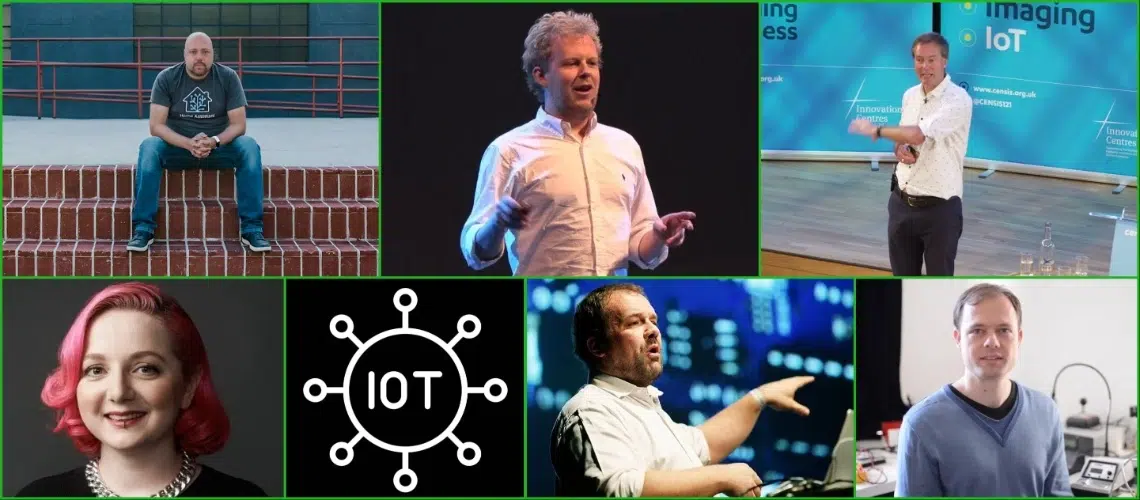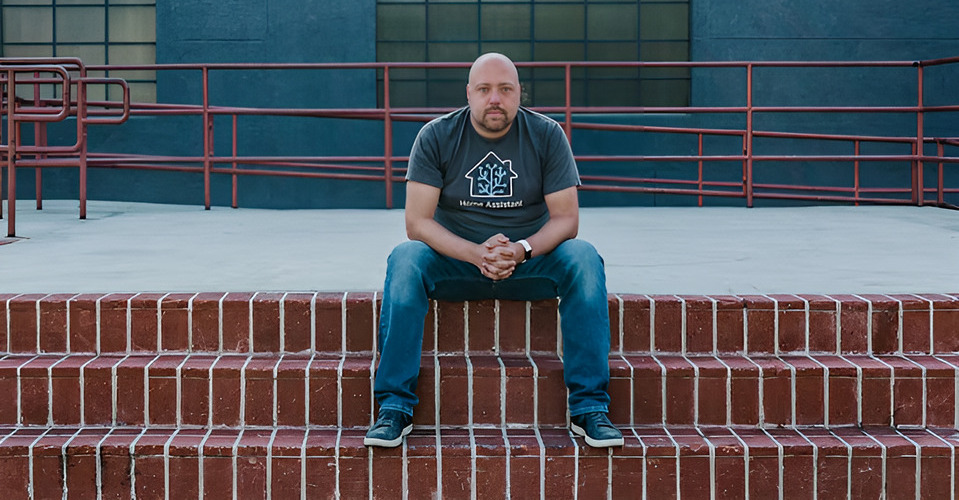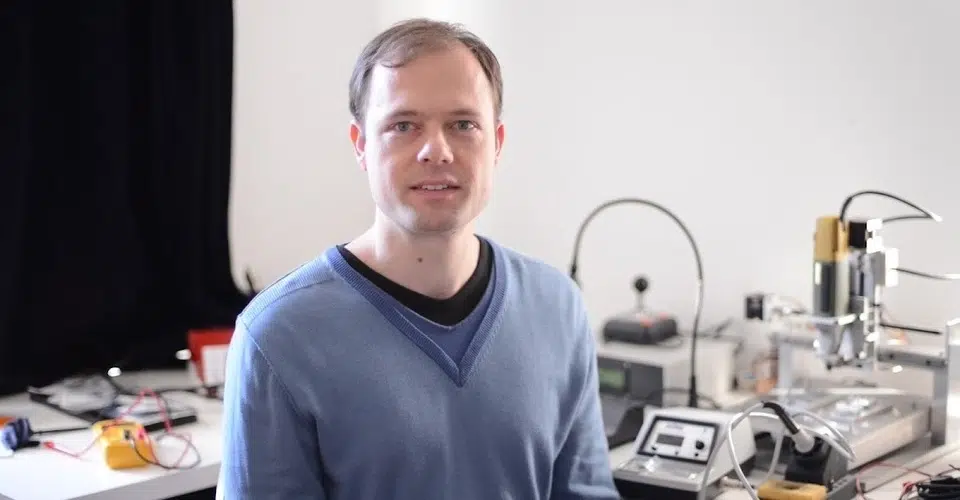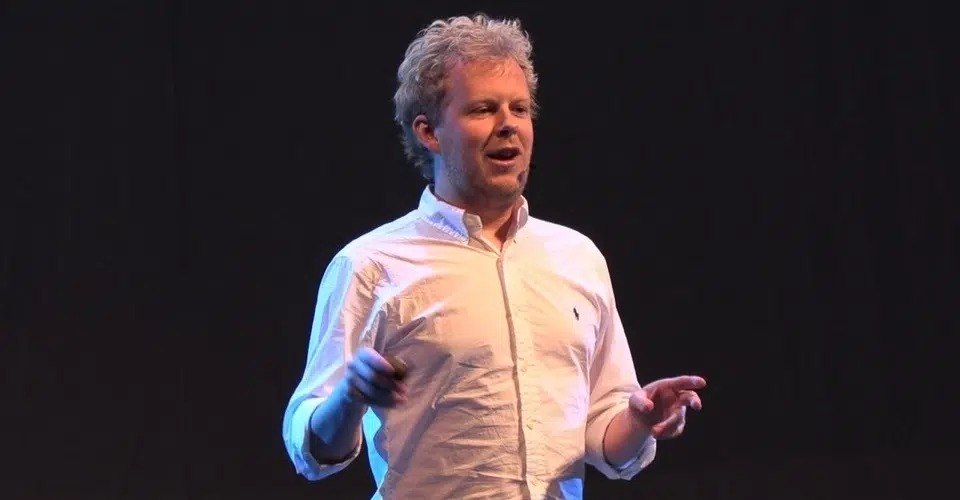16 Best IoT Developers for Smart Projects

No time to read the whole thing? Get an instant summary of this article, powered by 🤖 ChatGPT.
The Internet of Things field is driven by innovators excelling in coding and hardware, open-source projects, startup leadership, tech influence, contributions at major companies, and even accolades in competitions.
Below we present an updated list of top IoT developers globally, selected for their balanced achievements in open-source IoT platforms, founding or leading IoT startups while still coding, influential blogging and community building, impactful roles at tech giants, and in some cases, award-winning coding prowess (e.g., Olympiad champions). Each individual’s profile highlights their primary IoT contributions and current roles.
- Andy Stanford-Clark
- Pete Warden
- Massimo Banzi
- Ivan Kravets
- Limor “Ladyada” Fried
- Arlen Nipper
- Nick O’Leary
- Paulus Schoutsen
- Lisa Seacat DeLuca
- Damien P. George
- Adam Dunkels
- Benjamin Cabé
- Jan Jongboom
- Kai Kreuzer
- Bhuvnesh Arya
- Zach Supalla
Now, let’s delve into their remarkable journeys and contributions:
Andy Stanford-Clark

Nationality: British
Andy is the co-inventor of the MQTT messaging protocol – a lightweight publish/subscribe system that has become a backbone of IoT communications.
With over 25 years in IoT, he is IBM’s UK & Ireland Chief Technology Officer and an IBM Distinguished Engineer. Andy has led innovations from early remote telemetry systems to today’s edge computing solutions, and is famed for automating his home (even having his house tweet status updates in the 2000s).
Co-created MQTT (1998), now an ISO-standard protocol connecting countless “things”. Authored dozens of IoT patents (40+ patents) and helped shape IBM’s IoT architecture. He’s championed IoT in industry (e.g. remotely monitoring oil pipelines and ferries via sensors) and in community projects, proving the power of small devices and real-time data.
- X (Twitter): @andysc
- Website/Blog: stanford-clark.com
Pete Warden
The future of machine learning is tiny and bright.
Nationality: British
Pete is an IoT AI specialist who helped bring machine learning to the edge as the technical lead of TensorFlow Lite for microcontrollers.
A Brit turned Silicon Valley entrepreneur, Pete co-founded Jetpac (acquired by Google), then led the development of tinyML at Google, co-authoring “TinyML: Machine Learning with TensorFlow Lite on Arduino and Ultra-Low-Power Microcontrollers.” Now CEO of Useful Sensors, he’s creating smart sensor modules with built-in AI.
As founding member of the TensorFlow team, Pete created TensorFlow Lite Micro – enabling neural networks to run on IoT chips with as little as 16KB of RAM. This unlocked things like speech and gesture recognition on microcontrollers. He also open-sourced numerous ML models and tutorials for Arduino, inspiring the TinyML movement. At Useful Sensors, Warden is productizing AI-enabled IoT sensors (e.g., person detection modules) to simplify adding intelligence to devices. His vision is to embed privacy-preserving AI in everyday objects, fulfilling an early IoT promise.
- LinkedIn: Pete Warden
- X (Twitter): @petewarden
- Website/Blog: petewarden.com
Massimo Banzi

Nationality: Italian
Co-founder of Arduino and a pioneer of the maker movement, Massimo helped democratize electronics prototyping with the Arduino microcontroller platform. An interaction designer-turned-entrepreneur, he has made open-source hardware accessible to millions of IoT developers and students worldwide. Banzi remains a leading educator and technologist, serving as Arduino’s chairman and evangelizing open-source innovation in IoT.
Created the Arduino platform in 2005 and guided it to become a cornerstone of DIY IoT projects. Author of Getting Started with Arduino, he has fostered a global IoT developer community. Continues to spearhead Arduino’s product strategy, bringing advanced IoT hardware (like the Arduino Nicla and Portenta lines) to market.
- LinkedIn: Massimo Banzi
- X (Twitter): @mbanzi
- GitHub: mbanzi
- Website/Blog: massimobanzi.com
Ivan Kravets
Nationality: Ukrainian
Ivan is a software developer who created PlatformIO, an open-source IoT development ecosystem that has greatly simplified embedded programming across platforms.
Launched in 2014, PlatformIO provides a unified IDE, build system, and library manager for microcontroller projects, and it supports Arduino, ESP32, ARM Mbed, and dozens of frameworks. Ivan’s work allows IoT developers to code and deploy to any board without juggling complex vendor toolchains.
Founded PlatformIO to solve the pain of multi-platform embedded development – it offers one environment for many architectures, boosting developer productivity and collaboration. Kravets built a thriving community around PlatformIO, now used by engineers and hobbyists globally (integrated into Visual Studio Code and embraced by Arduino for its pro IDE). He also developed SmartAnthill (an earlier open IoT project) and has been a vocal proponent of modern, open DevOps practices in firmware development.
- LinkedIn: Ivan Kravets
- X (Twitter): @ikravets
- GitHub: ivankravets
- Website/Blog: ikravets.com
Limor “Ladyada” Fried

Nationality: American
Limor is an electrical engineer and open-source hardware trailblazer who founded Adafruit Industries in 2005.
Renowned for making electronics learning fun and accessible, she has built Adafruit into a leading supplier of DIY IoT kits and sensors, personally designing or vetting hundreds of products. Fried was honored by the White House in 2016 as a “Champion of Change” for her contributions to STEM education.
Creator of numerous open-source IoT hardware modules and tutorials, enabling makers to build projects with Arduino, Raspberry Pi, and sensors. Under Fried’s leadership, Adafruit has become a hub for IoT innovation and a 100% woman-owned manufacturing company. She’s influential in the open-source hardware movement, having participated in drafting the Open Source Hardware definition.
- LinkedIn: Limor Fried
- X (Twitter): @ladyada
- GitHub: ladyada
- Website/Blog: ladyada.net
Arlen Nipper
Nationality: American
Arlen is an embedded systems veteran and the co-inventor of MQTT alongside Andy Stanford-Clark.
With 40+ years in SCADA and industrial control systems, this American engineer has helped shape how machines communicate reliably over unreliable links. He has designed real-time control systems for oil & gas and co-founded Cirrus Link Solutions, where he continues to develop IIoT (Industrial IoT) connectivity software.
Co-developed the MQTT protocol in the late 1990s to link remote oil pipeline sensors over satellite – laying groundwork for today’s IoT messaging. Nipper’s work ensured MQTT stayed efficient and open, becoming the “dominant IIoT messaging standard”. At Cirrus Link, he’s built MQTT-based platforms for industrial clients, focusing on secure, high-performance telemetry.
- LinkedIn: Arlen Nipper
Nick O’Leary
Nationality: British
Nick is a software engineer and IoT toolmaker best known as the co-creator of Node-RED, a popular open-source flow-based programming platform for wiring IoT devices and APIs.
Hailing from the UK, Nick developed Node-RED at IBM and now leads its development through the OpenJS Foundation. He’s a champion of low-code IoT programming, enabling experts and beginners alike to connect hardware, services, and sensors with ease. In 2013, O’Leary (with Dave Conway-Jones) built Node-RED as a side project at IBM, originally to visualize MQTT topic mappings. Open-sourced later that year, Node-RED quickly became a defacto IoT integration tool, with 5,000+ community-contributed nodes and adoption from edge gateways to the cloud.
Nick has since founded FlowFuse to expand Node-RED’s enterprise capabilities, all while maintaining its open-source core.
- LinkedIn: Nick O’Leary
- X (Twitter): @knolleary
- GitHub: knolleary
Paulus Schoutsen

Nationality: Dutch
Paulus is the creator of Home Assistant, an open-source home automation platform that puts local control and privacy first.
This Dutch software engineer started Home Assistant in 2013 as a Python project to integrate smart devices, and it has since grown into a cornerstone of smart home IoT with over 2 million active installations in 2024. Paulus also co-founded Nabu Casa, ensuring Home Assistant’s sustainability while he continues coding and guiding its roadmap.
Developed Home Assistant into one of the world’s largest open-source IoT ecosystems, enabling tens of thousands of users to unify lights, sensors, and appliances regardless of vendor. He leads a community of contributors maintaining 1900+ device integrations. Schoutsen’s commitment to open standards (Z-Wave Alliance board member) brings broad protocol support to Home Assistant. His work exemplifies how a hobby project can evolve into critical smart home infrastructure, all while staying open and privacy-centric.
- LinkedIn: Paulus Schoutsen
- X (Twitter): @balloob
- GitHub: balloob
Lisa Seacat DeLuca
Nationality: American
Lisa is a Distinguished Engineer at IBM and one of the most inventors in IoT and related technologies.
An American software engineer, she has filed over 600 patent applications (with 300+ granted) spanning IoT, mobile, and AI – making her IBM’s most female inventor ever. She led IBM’s “App Factory” for Watson IoT, driving the incubation of IoT and digital twin solutions. A tech speaker and author, Lisa stands out as an influential woman in IoT.
As Director of Offering Management in IBM’s IoT division, DeLuca oversaw the development of IBM’s IoT Building Insights and digital twin offerings. She has been instrumental in integrating IoT data with IBM’s AI (Watson) to deliver actionable insights for enterprises. Her enormous patent portfolio includes ideas across cloud, IoT, and cognitive computing – reflecting innovative approaches to connect and secure “things”.
Lisa’s advocacy and visibility (TEDx speaker, Women in Tech Hall of Fame inductee) have also inspired many in the field, especially women in STEM.
- LinkedIn: Lisa Seacat DeLuca
- X (Twitter): @LisaSeacat
- Website/Blog: lisaseacat.com
Damien P. George

Nationality: Australian
Damien is an Australian programmer and physicist who created MicroPython – a lean implementation of Python 3 for microcontrollers.
In 2013 he launched MicroPython via a successful Kickstarter, proving that even tiny IoT chips can run high-level languages. With a PhD from Cambridge, Damien blends academic rigor with practical engineering, leading MicroPython’s development and enabling Python developers to enter the IoT world with ease.
Invented MicroPython, which essentially put Python on devices as small as a thumb-drive, widely used in education, hobbyist projects, and commercial IoT products. He also designed the Pyboard microcontroller as a reference hardware for MicroPython. Today, MicroPython supports dozens of embedded platforms (ARM Cortex-M, ESP8266/ESP32, etc.) and has influenced projects like CircuitPython. Damien’s work significantly lowered the barrier to entry for IoT development by allowing use of a familiar language on embedded hardware.
- LinkedIn: Damien P. George
- GitHub: dpgeorge
- Website/Blog: dpgeorge.net
Adam Dunkels
Nationality: Swedish
Adam is a computer scientist and a pioneer in IoT networking software.
He created multiple fundamental protocols and systems for tiny devices, notably the lightweight IP stacks uIP and lwIP, and the Contiki operating system. With a PhD focused on networked embedded systems, he co-founded Thingsquare (an IoT startup) and has been recognized as one of the top innovators under 35 by MIT Technology Review.
Authored lwIP and uIP, TCP/IP stacks that allowed early low-power devices (8-bit and 16-bit micros) to join the Internet – foundational work that enabled the IoT long before the term was coined. Created Contiki, an open-source OS for memory-constrained sensors (used in early wireless sensor networks and even in space by satellites). Dunkels also invented Protothreads (ultra-lightweight threading for embedded C). His contributions are running in millions of IoT devices quietly. At Thingsquare, he worked on IoT mesh networking solutions leveraging those technologies.
- LinkedIn: Adam Dunkels
Benjamin Cabe
Nationality: French
Benjamin is a French IoT evangelist and program manager who has been a driving force in the Eclipse IoT open-source community.
As co-founder of the Eclipse IoT Working Group, he helped bring together dozens of projects (MQTT clients, gateways, device management tools) under one umbrella. Benjamin’s passion lies in connecting “big and small things” — he has built illustrative IoT projects (like connected greenhouse demos) to showcase the power of open tech. He currently works at the Linux Foundation (Edge & AI), continuing to champion open IoT standards.
Key organizer behind Eclipse IoT, which launched in 2011 and grew to over 40 projects – including critical IoT building blocks like Eclipse Paho (MQTT library) and Eclipse Leshan (LwM2M device management). Cabé’s advocacy and community building have provided IoT developers with production-quality open tools and testbeds. He also co-created IoT meetup groups and frequently speaks at conferences (ThingMonk, EclipseCon) to spread IoT knowledge. Through blog posts and webinars, he’s educated many on using open-source stacks for IoT.
- LinkedIn: Benjamin Cabé
- X (Twitter): @kartben
Jan Jongboom

Nationality: Dutch
Jan is an IoT developer and entrepreneur pushing the boundary of Edge AI.
As co-founder and CTO of Edge Impulse, he enables developers to create TinyML models for IoT devices. Jan previously worked at Arm, contributing to the Mbed IoT OS and prototyping connected devices. A open-source contributor, he’s advocated for bringing machine learning to resource-constrained hardware and has built tools to simplify IoT development at all levels of the stack.
At Arm, Jan was instrumental in Mbed OS and built libraries to connect devices over LoRaWAN and BLE. In 2019, he teamed up with Zach Shelby to start Edge Impulse, a platform now widely used to train and deploy ML models on microcontrollers (from audio keyword spotting to vibration analysis). Through Edge Impulse, Jongboom has empowered thousands of IoT engineers to add intelligence to their sensors and microcontrollers with ease. He’s also a frequent speaker who live-demos TinyML projects (like gesture recognition on simple boards) to inspire the community.
- LinkedIn: Jan Jongboom
- X (Twitter): @janjongboom
- GitHub: janjongboom
- Website/Blog: janjongboom.com
Kai Kreuzer
Nationality: German
Kai is a software architect and open-source home automation leader.
He founded openHAB (Open Home Automation Bus) in 2010 and has served as its project lead. An advocate for open standards in smart homes, Kai also spearheaded the Eclipse SmartHome project and works at Deutsche Telekom’s innovation labs on IoT solutions. His work has unified diverse devices under a single open platform, benefiting developers and users seeking custom smart environments.
Created openHAB, an open-source IoT integration platform that became a top choice for DIY smart homes with its flexible rules engine and modular design. As President of the openHAB Foundation, Kreuzer helped nurture a worldwide community contributing add-ons for hundreds of devices. He brought openHAB into the Eclipse Foundation (as Eclipse SmartHome) to further open IoT interoperability. Kai’s efforts significantly influenced smart home IoT standards – he is active in standardization and frequently shares his expertise at conferences, evangelizing privacy-friendly, user-driven smart homes.
- LinkedIn: Kai Kreuzer
- X (Twitter): @kaikreuzer
- GitHub: kaikreuzer
- Website/Blog: kaikreuzer.de
Bhuvnesh Arya
Nationality: Indian
Bhuvnesh is a seasoned Software Architect at Wesco based in Bengaluru, India, recognized for designing scalable, event‑driven IoT platforms that seamlessly integrate data from diverse devices and cloud partners.
He previously developed a sensor‑driven, microservice‑based parking management system at Siemens, showcasing his ability to optimize smart-city IoT solutions. His LinkedIn article, “IoT Based Smart Cities System Architecture” outlines a comprehensive smart-city ecosystem leveraging IoT devices, edge computing, and cloud services to manage urban infrastructure intelligently. Along with his platform Insight Veda, he continues to shape innovative IoT and cloud-based system design through thought leadership and community mentorship.
- LinkedIn: Bhuvnesh Arya
Zach Supalla
Nationality: American
Zach is an entrepreneur-developer who founded Particle (formerly Spark) in 2012 to simplify IoT development.
He conceived the idea after building an internet-connected light for his deaf father and went on to create one of the most widely-used IoT cloud platforms. Under his leadership as CEO (and hands-on coder in early days), Particle’s combination of hardware modules and cloud services has empowered over 240,000 developers to launch IoT products.
Built Particle into an all-in-one IoT platform, including Wi-Fi/Cellular microcontroller kits and a robust device cloud, making it easier to build, connect and manage internet-connected hardware at scale. Supalla guided Particle through the launch of the Photon (Wi-Fi dev kit) and Electron (cellular dev kit) and scaled the company to support major enterprise IoT deployments. He also fostered an open-source ethos – the Particle Device OS is open source, and the company engaged heavily with the maker community in its early Spark Core days.
- LinkedIn: Zach Supalla
Wrap Up
These legends represent exceptional talent, making them extremely challenging to headhunt. However, there are thousands of other highly skilled IT professionals available to hire with our help. Contact us, and we will be happy to discuss your hiring needs.
Note: We’ve dedicated significant time and effort to creating and verifying this curated list of top talent. However, if you believe a correction or addition is needed, feel free to reach out. We’ll gladly review and update the page.
Frequently Asked Questions
IoT is growing, with billions of connected devices expected to be in use across industries such as manufacturing, healthcare, and smart homes.
IoT consultants usually charge between $60 and $150 per hour, depending on specialization and project scale.
They design connected systems, integrate hardware and software, ensure data security, and optimize networks for scalability and performance.
Qualified IoT developers are less common than general software engineers, but they can be found through specialized tech job boards, agencies, and freelancer platforms.
Major adopters include Siemens, Bosch, Amazon, Google, and GE, as well as many startups in logistics, healthcare, and energy.
